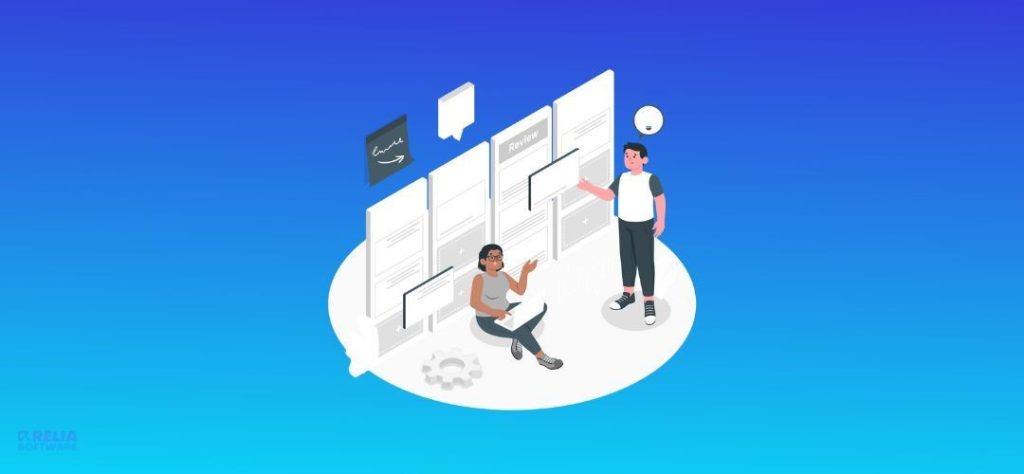How can you learn web development skills effectively with a detailed web development journey?
The realm of web development is dynamic, demanding continuous learning and adaptation from programmers. Staying relevant in this field requires continuing education and skill enhancement. The adage “practice makes perfect” rings true for web and software developers. This guide will delve into web developer job descriptions, education requirements, and practical strategies for learning web development skills.

Web Developer Job Descriptions:
Web developers leverage web-facing technologies to create and maintain websites and web applications. Every element visible on computer or mobile screens, from text and images to menus and forms, results from programming languages. As a web developer, my responsibilities include:
- Designing visual layouts.
- Integrating content and graphics.
- Optimizing website performance.
- Ensuring seamless user experience through testing.
The specifics of a web developer’s role depend on the project and team size. Some may specialize, while others work as generalists, handling all project stages. Key responsibilities include maintaining and enhancing existing web properties, coding new websites based on wireframe concepts, constructing website structure and content, collaborating with graphic artists or designers, launching sites, debugging, and liaising with stakeholders.
Types of Web Developers:
Front-end developers focus on what users see and interact with, while back-end developers handle the site’s functionality behind the scenes.
- Web Designer: Web designers craft website layouts and aesthetics using HTML, CSS, and JavaScript tools. They arrange text, graphics, images, videos, and other media to enhance user satisfaction.
- Front-End Web Developer: Front-end developers collaborate with designers to translate wireframes into code readable by web browsers. Using HTML, CSS, and JavaScript, they ensure the site’s layout is compatible across devices.
- Back-End Web Developer: Back-end developers ensure websites operate efficiently using languages like Python, Ruby, and SQL. They may also use HTML5, Java, and C++ for mobile app development.
- Full-Stack Developer: Full-stack developers manage front-end and back-end development, requiring broad technical expertise.
- UX (User Experience) Designer: UX designers analyze user behavior and collaborate with programmers to optimize user experience and engagement, often employing tools like heat mapping.
Education Requirements and Essential Skills for Aspiring Web Developers
Education Requirements:
To thrive as a web developer, one must possess the knowledge and skills to design diverse user experiences across various devices, including desktops and mobile phones. Web development jobs may have varied educational requirements, ranging from a high school diploma to a bachelor’s degree. Obtaining a professional certificate or an associate’s degree can be advantageous for entry into the field. Many web designers and developers begin their journey with a bachelor’s degree in computer science, computer programming, or a related field such as graphic design.
Technical Skills:
- HTML/CSS Skills: Web developers use HTML and CSS to style websites. CSS defines a website’s appearance, while HTML structures its pages.
- Responsive Design Proficiency: Understanding responsive design principles is crucial for creating websites that adapt seamlessly to various screen sizes, ensuring optimal device performance. This is particularly important as search engines prioritize mobile-friendly sites in organic search rankings.
- JavaScript Proficiency: JavaScript, a versatile programming language, enables adding advanced website features that enhance user interaction with elements like search bars, video players, or interactive maps.
- Analytical Abilities: Analytical skills, which blend elements of hard and soft skills, are vital for understanding customer needs, adapting to new challenges, and executing technical tasks such as code validation to ensure feature implementation.
- Back-End Basics: Familiarity with websites’ back end, or server-side, is essential. This includes understanding concepts like APIs (Application Programming Interfaces), SQL, and databases, which may be utilized or collaborated on with specialists.
- Search Engine Optimization (SEO) Search engine optimization (SEO) is a strategic approach employed to enhance a website’s rankings within search engine results pages (SERPs), consequently increasing its traffic. Web developers must grasp the fundamentals of optimizing sites to maximize their visibility in search engine rankings.

Soft Skills:
Effective Communication:
Proficient communication skills, encompassing public speaking, active listening, and articulation, are crucial for web developers. They may need to comprehend client requirements, respond effectively to inquiries, and present ideas coherently. Strong communication abilities contribute to improved job performance.
Emotional Intelligence:
High emotional intelligence enables web developers to maintain composure amidst professional challenges and respond adeptly in stressful situations. This skill is invaluable for navigating unexpected setbacks, managing budget constraints, and fostering positive working relationships.
Adaptability:
Adaptability entails the capacity to adjust strategies in response to evolving technologies or project demands. It complements emotional intelligence and facilitates seamless transitions when encountering new design approaches or technological advancements.
Problem-Solving Proficiency:
Web developers benefit from adept problem-solving skills, enabling them to anticipate, identify, and resolve issues effectively. Whether debugging a website or enhancing performance through software installations, solid problem-solving abilities are essential for achieving optimal results.
Time Management Techniques:
Efficient time management is indispensable for web developers working independently or as a team. It involves creating schedules and timelines aligned with project objectives, ensuring timely completion of tasks and deliverables. Effective time management fosters accountability and enhances productivity within development projects.
Tips for Beginners to Enhance Web Development Skills
- Utilize Appropriate Tools: It is fundamental to ensure you have the right tools and understand how to use them. Web designers typically rely on programs like Photoshop and Illustrator, while web developers require a solid set of web development applications. Tools may vary depending on individual preferences and professions, but task efficiency is critical.
- Engage in Open-Source Projects: Participating in open-source initiatives, such as those on GitHub, provides hands-on experience with coding. By forking existing projects or contributing to ongoing ones, you gain insights into different coding styles and techniques, expanding your knowledge base and exposure to diverse approaches.
- Pursue Your Interests: Focus on areas of web development that genuinely interest and motivate you. This prevents burnout and sustains your enthusiasm during challenging times. Embracing areas of growth that align with your passions fosters satisfaction and resilience in your development journey.
- Subscribe to Relevant Blogs: Stay informed by subscribing to blogs authored by industry professionals. Selectively engage with content that resonates with your interests and goals rather than passively consuming information. Blogs often offer practical insights and tutorials, enriching your understanding of web development practices.
- Cultivate Curiosity: Maintain a curious mindset to fuel continuous learning and growth in web development. Genuine interest in the subject sustains motivation and creativity, which are essential for navigating the inevitable challenges in your journey. Embrace curiosity as a driving force behind exploration and innovation in your career.
- Embrace Sprints for Productive Work Sessions: Implementing sprints can significantly enhance productivity. Break tasks into manageable segments, like drafting an essay in short bursts with breaks in between. Working in 10- to 20-minute intervals allows your mind to generate fresh ideas while preventing burnout. Returning to tasks with a refreshed perspective ensures sustained productivity.
- Share Your Knowledge Through Education: Even if writing isn’t your forte, consider starting a blog to share your insights and learning experiences. Writing about what you’ve learned helps organize your thoughts and deepens your understanding of the subject matter. Additionally, it may prompt further research, enhancing your expertise and establishing you as an authority in your field.
- Code Daily to Hone Skills: Consistent coding practice is essential for skill improvement. Establish a daily coding routine to accumulate hours of valuable experience. Over time, this commitment results in a robust skill set and boosts confidence in your abilities, making you feel like an actual programmer.
- Build a Comprehensive Portfolio: A portfolio showcasing your projects, websites, animations, and designs is essential for demonstrating your capabilities to potential clients or employers. It serves as tangible evidence of your skills, progression, and accomplishments, instilling confidence in your abilities.
- Maintain an Open Mind and Curious Spirit: Curiosity and enthusiasm are fundamental traits of successful web developers. Stay curious and open-minded, continuously seeking to learn and explore new ideas and technologies. These qualities form the foundation for a fulfilling and successful career in web development.
- Experiment with Different Techniques: Explore new programming languages or methodologies to add variety to your projects and combat monotony. While occasional lessons may not make you an expert overnight, they expose you to new concepts and keep you engaged in the learning process.
- Utilize Books as Learning Resources: Despite working in technology, reading books offers unique benefits. The depth and detail found in books surpass what free online resources or videos can provide. Coding books, regardless of your proficiency level, offer valuable insights and practical knowledge, making them essential learning tools, particularly for self-taught programmers.
- Engage in Online Communities and Forums: Participate in computer programmer groups and forums where individuals discuss various programming-related topics. These communities provide opportunities to ask questions, share experiences, and learn from peers. Exchanging ideas in closed or open forums fosters growth and collaboration within the programming community.
- Embrace Flexibility in Planning: Avoid over-structuring your workday to allow for creativity and relaxation. Flexibility in your schedule enables your mind to wander and rejuvenate, enhancing overall productivity. While consistent coding practice is beneficial, it’s equally important to incorporate breaks for optimal mental well-being and efficiency.
- Seek Mentorship from Experienced Programmers: Novice programmers should seek guidance from seasoned professionals to accelerate their learning journey. Experienced developers possess invaluable knowledge and insights from years of experience, making them excellent mentors. Learning from their expertise and receiving guidance can significantly enhance your growth and skill development as a programmer.
Average Web Developer Salary Overview
According to Glassdoor, the average annual salary for web developers in the United States is $81,957. This figure comprises a base salary of $77,367 and an additional average yearly bonus of $4,589. Other compensatory factors like commissions, bonuses, and profit-sharing may also contribute to total compensation. However, salary figures may vary based on expertise, geographical location, and years of experience.
Exploring the average salaries of web developers across different levels of expertise reveals the following:
- Entry-level: The average yearly wage for web developers with 1 to 3 years of experience is approximately $71,410, with a salary range of $46,000 to $112,000.
- Junior: With 4 to 6 years of experience, junior web developers earn an average yearly wage of around $79,916, with salaries ranging from $50,000 to $128,000.
- Senior: Web developers with 7 to 9 years of experience command an average yearly wage of $84,969, with salary ranges extending from $53,000 to $138,000.
Conclusion:
In conclusion, staying abreast of the constantly evolving digital landscape necessitates continuous investment in learning and honing web development skills. Following the advice provided in this article, web developers can enhance their competence, expand their knowledge base, and propel their professional growth.
Success in web development requires dedication, perseverance, and a growth mindset. By implementing strategies, exploring new approaches, and embracing lifelong learning, web developers can make a meaningful impact and achieve their career aspirations in 2023 and beyond.
